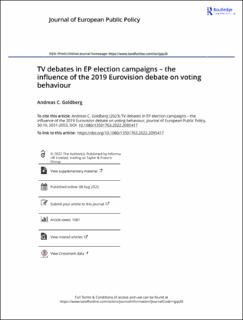| dc.contributor.author | Goldberg, Andreas | |
| dc.date.accessioned | 2023-12-01T07:48:32Z | |
| dc.date.available | 2023-12-01T07:48:32Z | |
| dc.date.created | 2022-08-09T10:13:53Z | |
| dc.date.issued | 2022 | |
| dc.identifier.citation | Journal of European Public Policy. 2022, 30 (10), 2031-2053. | en_US |
| dc.identifier.issn | 1350-1763 | |
| dc.identifier.uri | https://hdl.handle.net/11250/3105520 | |
| dc.description.abstract | Televised debates represent an integral part of election campaigns and with the introduction of the Spitzenkandidaten process also became part of the European Parliament (EP) elections campaign. Various characteristics of EP elections such as a generally lower (perceived) relevance of and participation in the elections, and also the relatively unknown lead candidates running for Commission President assign TV debates a crucial role to inform European citizens and assist them in their voting decision. Focusing on the second edition of the ‘Eurovision debate’ during the 2019 EP elections campaign, this article examines the impact of debate exposure on both the decision to turn out and party choice. The study uses original flash survey data collected after the debate in five countries (DE, DK, ES, HU, NL). These data are part of a larger panel-survey study, which allows to examine immediate effects in the days after the debate and also for the eventual decision on Election Day. Although citizens' debate exposure varies considerably across countries, and watchers further differ in their evaluations of the candidate performances, the results show a surprisingly negative effect of debate exposure on turnout, especially among more interested citizens, and basically no effects on party choice. | en_US |
| dc.language.iso | eng | en_US |
| dc.publisher | Taylor & Francis | en_US |
| dc.rights | Attribution-NonCommercial-NoDerivatives 4.0 Internasjonal | * |
| dc.rights.uri | http://creativecommons.org/licenses/by-nc-nd/4.0/deed.no | * |
| dc.title | TV debates in EP election campaigns–the influence of the 2019 Eurovision debate on voting behaviour | en_US |
| dc.title.alternative | TV debates in EP election campaigns–the influence of the 2019 Eurovision debate on voting behaviour | en_US |
| dc.type | Peer reviewed | en_US |
| dc.type | Journal article | en_US |
| dc.description.version | publishedVersion | en_US |
| dc.source.pagenumber | 2031-2053 | en_US |
| dc.source.volume | 30 | en_US |
| dc.source.journal | Journal of European Public Policy | en_US |
| dc.source.issue | 10 | en_US |
| dc.identifier.doi | 10.1080/13501763.2022.2095417 | |
| dc.identifier.cristin | 2041888 | |
| cristin.ispublished | true | |
| cristin.fulltext | original | |
| cristin.qualitycode | 2 | |

